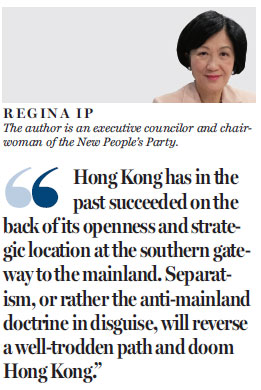Separatism will doom Hong Kong
Updated: 2016-04-18 10:07
By Regina ip(HK Edition)
|
|||||||
Regina Ip says nativism is a narrow, constricting force which will ultimately hinder a person's or a city's development and have disastrous consequences
A slew of bad news hit Hong Kong recently. On the financial side, downgrades of Hong Kong's credit rating and ranking as an international financial center followed in quick succession. The real economy is faring no better as both visitor arrivals and retail sales registered sharp declines in the first two months of the year. Businesses fear that the decline is not cyclical but part of a secular downturn arising from Hong Kong's loss of competitiveness across many sectors.
Those who care about Hong Kong and have been watching closely will not have been surprised. Last year, the Urban Competitiveness Report published by the Chinese Academy of Social Sciences found, for the first time, that Hong Kong's overall competitiveness had been overtaken by Shenzhen. Even more significantly, back in mid-2013, Strategic Forecast, a US-based global intelligence company, had warned of Hong Kong's "declining economic fortunes" arising from its "growing antagonism toward surging mainland cultural and economic influence into Hong Kong".
As an age-old Chinese adage suggests, an outside view sometimes provides greater insight into one's predicament. The US observer noted that "Hong Kong is experiencing an identity crisis". Hong Kong's growing discomfort over the mainland's growing influence had prompted "a tide of nativism that could make Hong Kong less appealing to outside businesses just as other cities are poised to seize investment opportunities". It also warned that, "If it (Hong Kong) is to keep its competitive edge, it is going to have to abandon the complacency born out of its advantaged position and start seeking new opportunities for growth."
Indeed, no better word describes Hong Kong's economic philosophy than "complacency". Resting on its laurels as the world's "freest economy", Hong Kong has long neglected the need to seize the opportunities offered by the mainland's economic surge to develop a comprehensive growth strategy. As though spellbound by the "50 Years No Change" mantra, Hong Kong's economic leaders have failed to alert their people to the transformative changes which have been occurring around them, or urge them to adapt to the new competitive paradigm.
US presidential candidate Donald Trump's popularity appears to signal a global surge of nativism which, at the same time, is being countered by a global chorus of condemnation. There is nothing more natural than loving the country or city where one has grown up. Yet if nativism is erected into an end in itself, and puts whatever is local above ideas and connections which create value, then nativism becomes a narrow, constricting force hindering a person's or a city's development.
Unfortunately, as forewarned by outside observers, Hong Kong's nativism has degenerated, in some quarters, into a battle cry for change by illegal and violent means, as seen from the riots in Mong Kok at the beginning of the Chinese New Year.
Recently, political groupings purporting to represent young people have emerged urging the establishment of Hong Kong as an independent state and autonomy in deciding its future. These young people have no idea that they could be putting Hong Kong on a potentially dangerous collision course with its motherland and bringing an unmitigated disaster to Hong Kong.
The reality is Hong Kong has been an inalienable part of China from ancient times. It is destitute of natural resources - its greatest assets have been its geographical location and the prodigious industry and ingenuity of its people. It is dependent on the mainland for its food, water and other basic necessities. Its economic fortunes are increasingly interwoven with those of the mainland - a valid point made by the credit agencies which downgraded Hong Kong's risk ratings. If, however unlikely, Hong Kong became a separate state, the first thing it would lose - which is highly treasured by Hong Kong people - is the Hong Kong Special Administrative Region passport, which enjoys visa-free treatment by 156 countries and territories. The issue of the passport was authorized by the central government, which has guaranteed the ability of its holders to return to Hong Kong.
Hong Kong would also lose other hard-won economic benefits guaranteed by the Basic Law, such as its separate shipping register and civil aviation negotiating rights. It would need to renegotiate its membership or participation in many international forums which admit non-state parties. Yet such negotiation would be impossible if Hong Kong's officials could not travel and international organizations lost confidence in Hong Kong's viability, as a risky, closed entity.
Financial markets would plummet, and businesses would be doomed, as the international community looked with dismay at Hong Kong's severance from its sovereign power. Investments would dry up, and the breakdown of law and order would follow economic misery.
Hong Kong has in the past succeeded on the back of its openness and strategic location at the southern gateway to the mainland. Separatism, or rather the anti-mainland doctrine in disguise, will reverse a well-trodden path and doom Hong Kong.

(HK Edition 04/18/2016 page11)